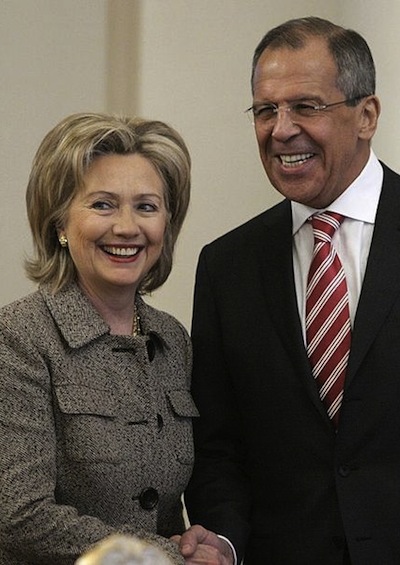U.S.-Russia: Seeking Salvation in Sanctions
U.S. foreign policy is driven by acts of symbolism. When they fail, the U.S. is quick to blame others.
May 4, 2014

Remember the “reset” with Russia? That was not a soft-hearted initiative pursued by Germany’s Angela Merkel. Rather, in March 2009, it was a newfangled (and soft-headed) maneuver by “HRC” — Hillary Clinton, the presumed 2016 Democratic Presidential candidate.
At the time, her foray was billed as a wise maneuver to improve relations with Russia. Other nations had their doubts. They saw it as a classic Clintonian move — buttering up the very untrustworthy Vladimir Putin, by “virtue” of a publicity stunt.
In the foreign policy arena, nations ought to pursue their (long-term) interests. U.S. leaders apparently pursue their hobbyhorses. Just note John Kerry’s obsession with the Middle East, even though his hands are firmly tied behind his back.
Of course, falling prey to the lures of the politics of symbolism in the foreign policy arena is anything but a disease that affects solely the Democratic Party. It affects Republican presidents at least as much.
George W. Bush’s efforts to export democracy (to the Middle East), conduct the War on Terror, etc. have either backfired or yielded dubious results pretty much on each and every front.
A decade on, Iraq is still completely unstable. But hey, it’s mission accomplished, isn’t it? At least Iraq’s oil production is now higher than in post-Gulf War times.
Fail – and then blame other nations
However, once the failure of the erstwhile grand idea is inescapable to any observer, a shrewd maneuver is entered into. Since it is inconceivable for this current American leadership – or pretty much any American leadership – to admit to strategic errors, the blame is laid at the feet of other nations.
And so it is now. As Americans can read in the news pages, the blow-up in relations with Russia is reported (!) to be the Germans’ responsibility. As the indoctrinators (not really reporters) argue, the trouble with Russia is that … the Germans are not prepared to join the latest American chorus line – whether it is to start a new Cold War with Russia or to seek salvation in imposing sanctions.
Never mind that Angela Merkel has steadfastly resisted the previous American effort to cozy up to Putin. She is a foreign policy realist, not a PR-stunt driven politician.
“Allies” or subordinates?
Even so, the old rules of the game still apply: When Washington changes its tune, other nations in the West are simply supposed to follow. No whys, ifs or buts?
The trouble with such a stance is that most other nations are no longer able to make rhyme or reason out of U.S. foreign policy.
And there really isn’t any. The only “pattern” to describe U.S. foreign policy is that it is always shaped by the latest fad Washington elites have seized upon in order to corral an increasingly dubious public into the U.S.’s never-ending series of ill-fated foreign policy adventures. The list is long.
What the Washington crowd tries to ignore is that such a series of poorly reasoned, poorly designed or poorly executed campaigns have consequences.
Other nations will shy away from following such a “mis-leader” – or do so only with ever-greater hesitation. That insight, however, is a complete anathema to the entire Washington foreign policy establishment. What me/us wrong? Impossible!
The trouble is that the rest of the world isn’t buying the wisdom of Washington’s ways any longer. Sure, there are always some nations who are, at a given time, inclined to cozy up to the United States for whatever reason. But that doesn’t make them dependable allies. It outs them as supplicants.
Resisting yet another fad
As far as the German role is concerned at the present time, resisting a “Sanctions Über Alles” policy is well advised. There is no evidence that the U.S. inclination to assign all-healing powers to a single foreign policy instrument – now sanctions (previously drones, before that something else) — works in the real world.
Rather, it is a convenient tool to try to force the “allies” into the functional equivalent of a kowtow position. That, though, is not leadership.
It’s a very transparent effort to distract the American public from realizing that its leaders – irrespective of which political stripe/party they stand for – have engaged the nation in yet another failed foreign policy maneuver.
Afghanistan? Iraq? Egypt? Libya? Syria? Japan? Korea? Under Bush or Obama, none can be called a success – at the very least not without a big asterisk. Meanwhile, the hyperactivity syndrome in some of these arenas is curiously paired with a determined stance of complete inaction on other vital fronts, such as climate change.
“Big Things” doesn’t amount to solid strategy
In the end, the birth defect of modern U.S. foreign policy is that it is driven by an irrepressible impulse to engage in the next “Big Thing.” It is ultimately pursued with the same groupthink, obsessiveness and primitive stimulus-response mechanisms as one finds in the culture of Silicon Valley today.
Neither approach is a sustainable model leading to great things. What it does lead to is a lot of breathlessness, accompanied by endless amounts of hype.
All of which is rich pickings for Rand Paul and his 2016 Presidential campaign. The American people are plain tired of being taken for a ride. They no longer want to live in a world where the next “Big Thing” in foreign policy becomes the next national obsession.
Now we are told that, pursuing an ardent defense against cyber crimes is the next big national priority. But what about roads, bridges and secure pensions? Is expressing that as the top priority really akin to isolationism – as the Washington crowd constantly tries to convince the American people at large?
Takeaways
U.S. foreign policy is driven by acts of symbolism. When they fail, the U.S. is quick to blame other nations.
Nations should pursue longterm interests in the foreign policy arena. U.S. leaders have hobbyhorses.
When Washington changes its tune, other Western nations are supposed to follow.
Angela Merkel is a foreign policy realist, not a PR-stunt driven politician like Hillary Clinton.
U.S. foreign policy is always shaped by the latest fad Washington elites have seized upon.
A doubtful American public is corralled into a never-ending series of ill-fated foreign policy adventures.
U.S. foreign policy is driven by the same groupthink and stimulus-response mechanisms as Silicon Valley.
Cyber security is next as a national priority. But what about roads, bridges and secure pensions?
Is focusing on domestic affairs really akin to isolationism – as the U.S. foreign policy crowd implies?
Read previous

The Transatlantic World is Falling Apart
May 2, 2014
